Pupil Voice & Wellbeing
Here you will find information about the innovative ways that we work with our pupils to offer them exciting opportunities to develop. Wellbeing and Emotional Health are at the forefront of our work in school. All pupils and staff have opportunities to build on their own wellbeing and resilience to be active citizens.
Pupil Voice
Key to the aims and ethos of Newfield is our striving to ensure that all of our children have a ‘voice’ - that is, they are able to make choices and communicate preferences, in a way that is appropriate to them. We work closely with Speech and Language Therapists to give our pupils the best opportunities to develop that ‘voice’. More information about how we do this can be found in the communication sections of the website.
The promotion of communication has a high profile in the school. All pupils have an expressive communication target set within their annual review which ensures the best possible input to support them to communicate in whatever way is most appropriate. RRSA, June 2017
The pupils have a variety of ways of contributing to the running of the school and being genuinely listened to:
- School Council
- RRSA Steering Group
- Buddies
- School Counsellor
- Pupil Complaints Procedure
Staff help pupils to ‘find their voice’ through speech or their ability to use communication aids. (Ofsted, 2021)
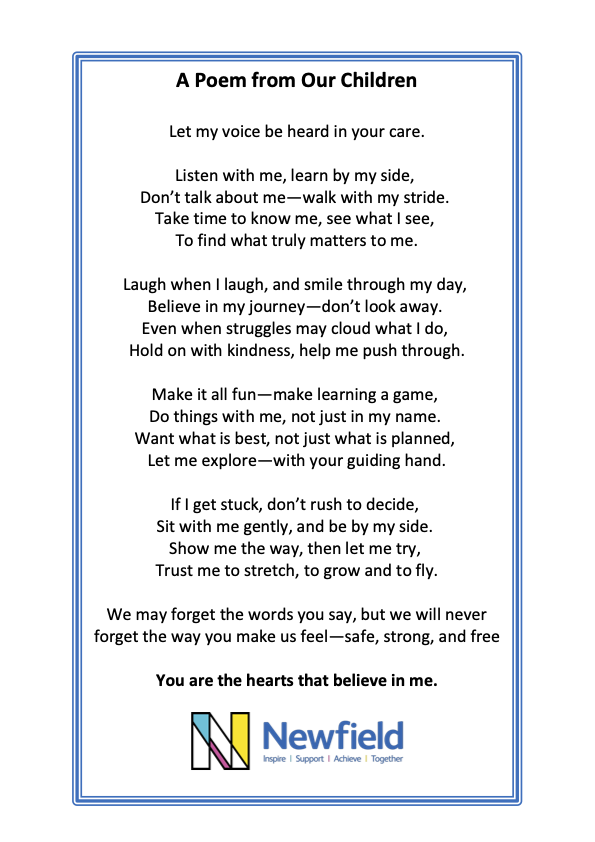
School Council
The School Council meets every half term and ensures that each class in school is represented.
The representatives are elected annually and act as advocates for their class mates.
They discuss a wide range of things and can make requests that key staff attend and answer them directly about areas of school ranging from curriculum to facilities to fundraising to food!
The School Council welcomes visitors from a range of local council areas to inform them and also to ellicit their opinion.
The School Council is facilitated by the school counsellor.
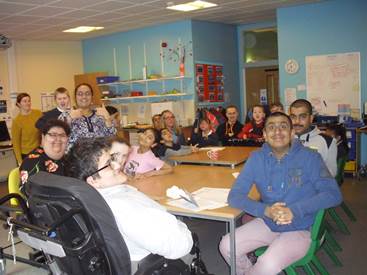
Rights Respecting School Steering Group
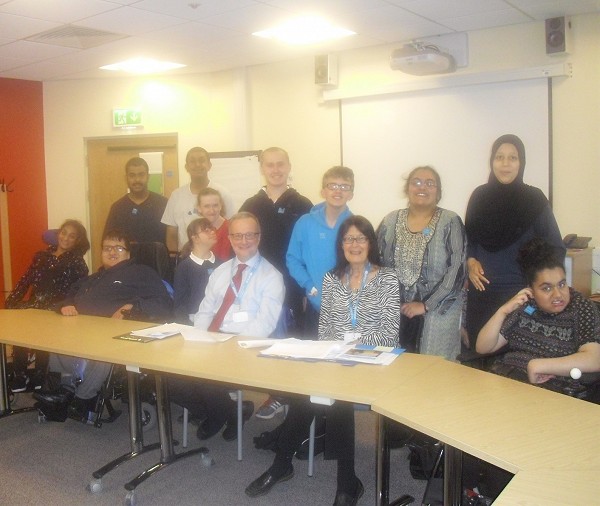
UNICEF Ambassdors!
The RRSA Steering Group also meets half termly and works predominantly on ensuring that the school, and the wider community locally and internationally, continues to celebrate and to further protect children’s rights.
It is made up of a group of pupils, parents, friends and staff.
The steering group has a number of links and initiatives and organises many whole school activities, including Fairtrade events and fundraising.
The steering group takes part in new staff induction, staff interviews, takes workshops to local schools and hosts other Rights Respecting schools who wish to develop their work and request support.
The group continues to work collaboratively locally and internationally, with its support of projects in Kenya, Africa and links with Queens Lodge nursing home, Blackburn.
We hold the Gold award: the highest stage of the Rights Respecting Schools Award (after Bronze: Rights Committed and Silver: Rights Aware). It is granted by UNICEF UK to schools that have fully embedded children’s rights throughout the school in its policies, practice and ethos, as outlined in the three RRSA Strands.
If you would like more information about the RRSA at Newfield, please get in touch!
The pupils spoken to clearly enjoyed being able to express, using their different communication skills, their knowledge of a wide range of rights. RRSA, June 2017
Newfield RRSA Steering Group... Voice their rights!
Mental Health & Wellbeing
At Newfield the mental health and wellbeing of our pupils and staff is something that we take very seriously.
Newfield holds the nationally accredited Wellbeing Award for Schools.
We work hard with our health colleagues to help our children be physically well, through therapy programs, exercise and health support - and we also recognise how important mental health and wellbeing is for everyone. We have developed a wellbeing policy outlining our work on emotional health and wellbeing of pupils, families and staff.
We try to ensure that our children have opportunities to explore how they are feeling and develop strategies to understand themselves and reflect on who they are as people and what they can do ensure they are happy - and what they can do when they are not!
We view all behaviour as a means of communicating, so when something is not going well, we try to understand what the cause may be and help children to address that.
Working with the school counsellor, as a school we are developing our mental health and wellbeing offer. We want to help our children be resilient and build on their strengths, and to support this, some of our staff have taken part in Mental Health First Aid training. We are also working collaboratively with local specialist schools to explore innovative ways of supporting the wellbeing of our staff, in order for them to be even better equipped to support our children.
The website Childline offers lots of support, ideas and contact information to help children and also provides advice to adults to help them t support children.
We have joined the Schools in Mind network which provides us with information and resources to support the mental health and wellbeing of the children and young people in our care.
If you would like more information about mental health, the charity Mind is full of advice, guidance, ideas and support.
The Happy Space Digital Wellbeing Guidebook contains lots of nice ideas for paretns and young people about activities to support mentl health and wellbeing!
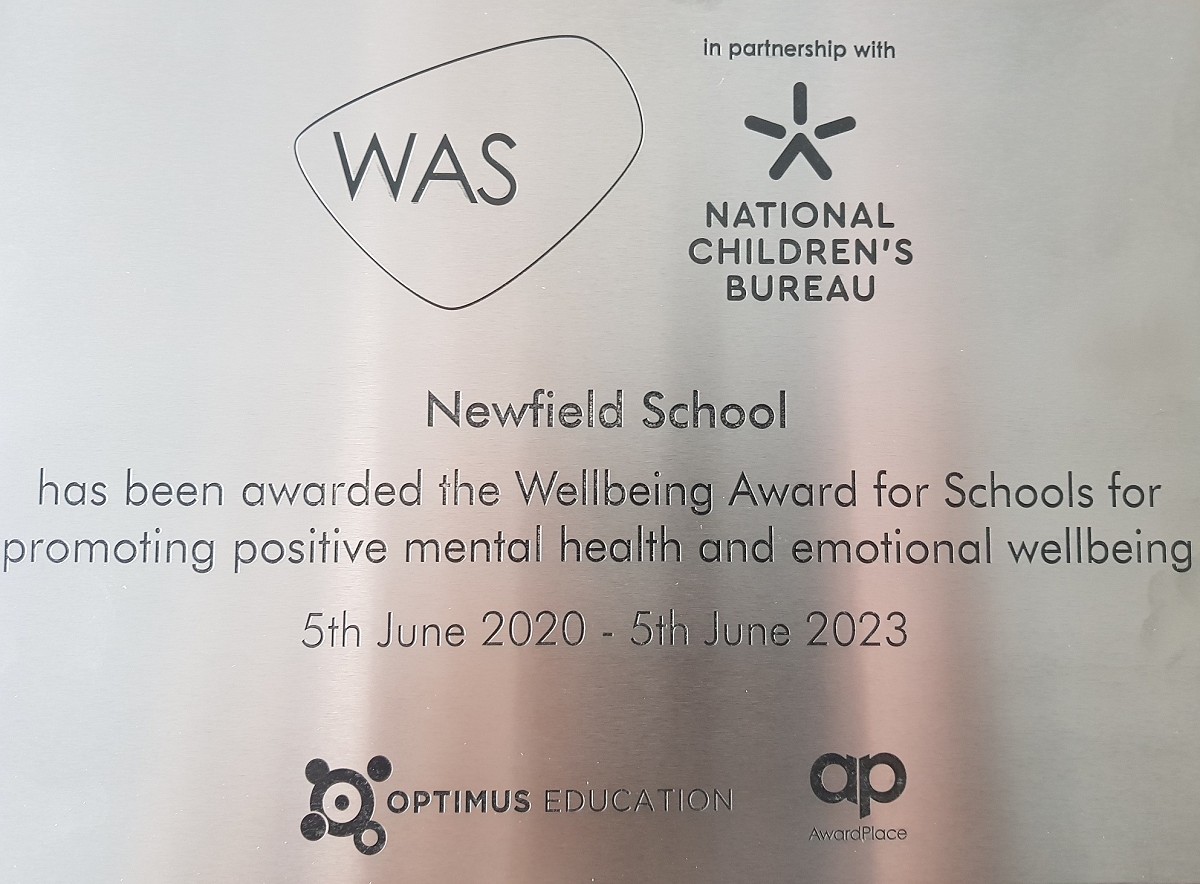
Zones of Regulation

Zones of Regulation - teaches strategies for self regulation and understanding emotions
At Newfield we believe that regulation is essential for leading a healthy and meaningful life.
Using Zones of Regulation, we empower learners to understand the full range of their feelings, as well as explore tools and strategies to support their well-being.
Feelings are complicated and all feelings are valid and can be used to help us to grow as people.
This simple method of sorting emotions into 4 zones, and learning what we can do to regulate ourselves means we can all spend more time learning!.
National School Breakfast Programme
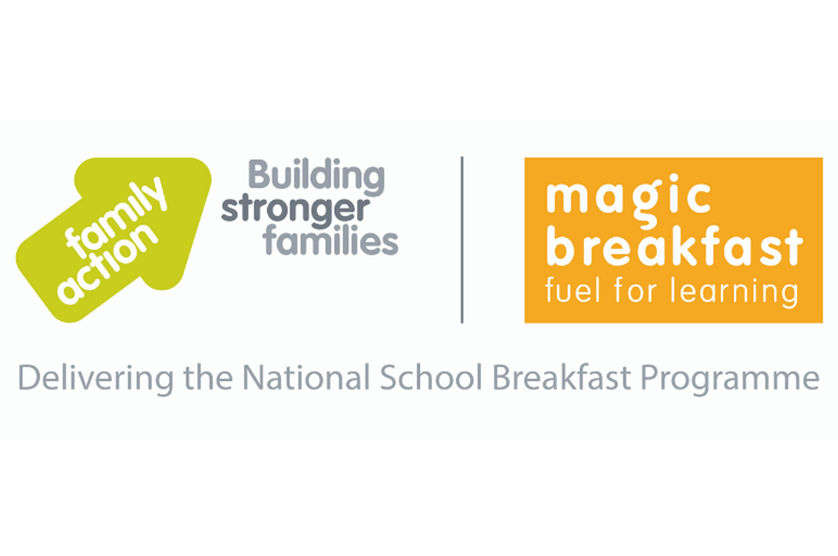
Newfield is delighted to be part of the National School Breakfast Programme from September 2020.
We will be working with Family Action and Magic Breakfast to ensure that all families who want to, have access to a healthy breakfast for their children completely free of charge.
We will be sending home cereal, porridge and bagels each fortnight to allow all children to eat a healthy breakfast before school, in order to support their learning.
Any child who struggles to eat breakfast at home will be able to access the same healthy breakfast in school.
Person Centred Approaches
At Newfield, we work using a Person Centred Approach - this is a way of looking at your child and placing them at the centre of any decisions that are made in order for them to live the lives that they want to lead.
It aims to give a voice to all children and young people by joining together people who are important to your child and building a picture, formed from different perspectives, of what is key in the life of your child to make them healthy, safe, happy and able to contribute and achieve.
Underpinning the school’s work is a ‘person centred approach’ in which the child’s voice is the hub of any decisions made. Leaders and other adults have a clear picture of what is key in the life of each pupil. Ofsted, 2016
An ‘all about me’ profile will be created, with you and your child, to look at what is important to your child right now and to help to think about aspirations for the future. This document is useful when your child is meeting someone for the first time in letting the person know, in a few words and/or pictures, about your child from a range of perspectives.
At Newfield we also use our Person Centred Approach to help our young people and their families plan for transition and future life beyond school. In their final year, our young people meet with our school counsellor individually for sessions to explore what their aspirations are and together they create a profile which they take with them when they leave. These sessions are tailored to individual needs and may include intensive interaction, alternative communication techniques and activities to engage young people and help them to reflect on the future.

Pupils benefit from an effective personal development programme. Bullying is very rare because staff provide highly effective support during social times. . Ofsted, 2021
Attendance
We know that good attendance is central to a child making good progress - and our children love coming to school! Some of our children are not well enough to attend school sometimes, and when this happens we work closely with families and health care professionals to support wellbeing, both of the pupil and of the surrounding family. Where appropriate we will support learning to continue in the home or hospital setting, through suggesting activities, providing resources and facilitating occasional visits from a familiar member of the child’s class team.
We work to promote school attendance in accordance with our policy which can be viewed here in our Attendance Policy
There is a real sense that pupils enjoy their learning and have no desire to waste time unnecessarily. Testament to this is the high proportion of pupils who have the highest levels of attendance at the school’ Ofsted, 2016
School Data Academic Year 2024-25
- Attendance 87.85%
- Authorised Absence 10.68%
- Unauthorised Absence 1.47%
The data national for Special school attendance currently is: 86.4% (10.4% authorised and 3.2% unauthorised).
Based on Newfield whole school attendance of 23-24 – 87.52% and 24-25 - 87.85% we are consistently above national average
Thus we are pleased to see an improvement in attendance follwing the introduction a new policy and procedures in September 2023 with the intention of reducing pupil absence.
We use the FFT (Fisher Foundation Trust) Aspire Attendance Tracker, which helps us to analyse, track & compare our students’ attendance, benchmarking with schools nationally.
For the academic year 23-24 governors set a target of 87%.
For the academic year 24-25 governors set a target of 88%.
Inclusion / Outreach
At Newfield School we offer a very comprehensive Outreach programme. We try to ensure that all our pupils benefit from an appropriate opportunity to join in activities with their mainstream peers.
We are a Flagship School for the Inclusion Quality Mark.
Staff… were keen to espouse the qualities of other members of staff in a genuine and selfless way. It made it obvious how the children have learnt to be so community spirited and kind to each other. ’ IQM, May 2022
Classes in 2-11 Department may have mainstream primary partner schools. The schools visit us here for informal play/classroom activities. Children in this age phase may also visit local parks. All children take part in a ‘summer trip’.
Pupils in KS3 take part in activities at a variety of community venues, supermarkets and cafes developing valuable social skills.
Pupils in KS4 work with a peers on social and relationship buildings skills following the Asdan Award Scheme. They access community venues to build independence.
In our 16 -19 Department students experience activities at venues that they may consider attending when they leave school including My Step Up Farm, Blackburn College, Purple Patch and Youth Zone, alongside community venues and shops. They also run an occasional stall on Blackburn Market. Where appropriate these young people may take part in ‘travel training’ - learning to use public transport.
We have a longstanding link with Stonyhurst College, who come each week with a range of students ot support our wheelchair dancing sessions - these encourage cooperation, collaboration and lots of fun! We also have children able ot visit Stonyhurst in the summer for days, and even holidays.
…Through these and other high-quality activities, pupils develop their understanding of being a good citizen.’ Ofsted, 2021
There are many benefits for both Newfield pupils and their mainstream peers; giving the opportunity to work in a different environment, make new friends and practice new skills. For our mainstream partners it provides a valuable opportunity to raise awareness of disability and promote our belief of equal opportunities for all.
It is clear that he (a pupil) and countless others are exactly where they need to be. Surely there is no better example of inclusion.’ IQM, May 2022
Community Links
The school continues to extend and develop its links with the local community and wider community. As well as the inclusion opportunities mentioned, the school involves other members of the local community including religious groups, police and the use of facilities, such as swimming pools and shops.
Some pupils are also involved in careers and vocational education activities including the opportunity for work experience.
… when observing staff and children within the school… it was inspiring to hear how Newfield has worked so hard to become more visible, transparent, and active within the local community. IQM May, 2022
We also provide placements for local colleges and schools to assist in developing the knowledge and understanding of disability in the wider community. The school has had a number of stories covered by the local newspaper that assist in promoting a positive image of the school.
Multi Agency Working
As a school we actively promote the ethos of ‘a team around the child’. We have established links with key services aimed at promoting the well-being of our children and their families.
We strongly advocate a person centred approach in order to achieve the best outcomes.
We therefore work closely with colleagues from the children’s and adult’s social care teams, as well as the many other professionals who work to support our children and their families. We aim to hold joint reviews and meetings which place the children and young people firmly at the centre of the collaborative working.
Therapists and senior school leaders meet on a termly basis to discuss children’s needs in a holistic manner.
Within the school we have a number of health services as resident, including Nurses, Physiotherapy and Speech and Language Therapy.
We also host and support Occupational therapy and seating clinics.
A number of health consultants and paediatricians hold clinics here and we offer a co-ordinated response to health and medical needs through the nursing team.
Therapists are embraced as part of the teamwork approach. Adults’ consistent approach to the meeting of pupils’ specific needs is a result of effective communication between teachers, support staff and specialist staff such as the medical team. Ofsted, 2016